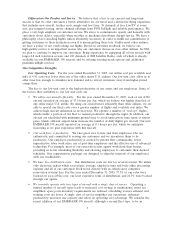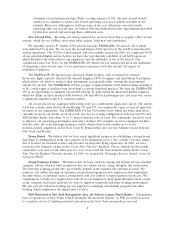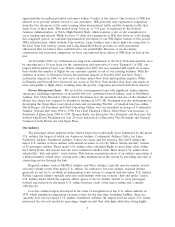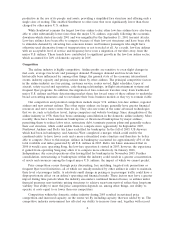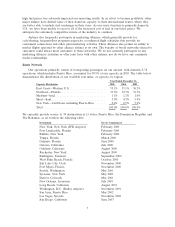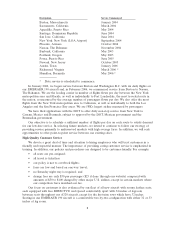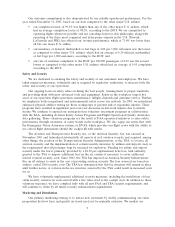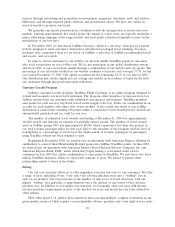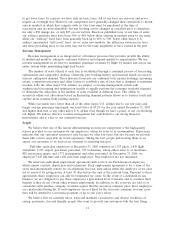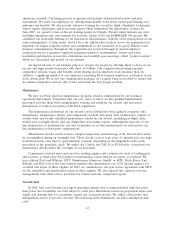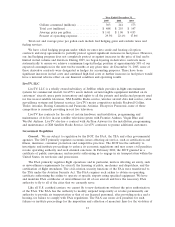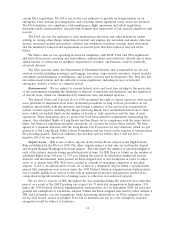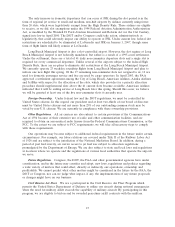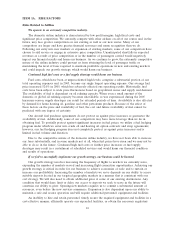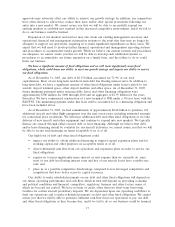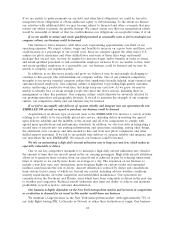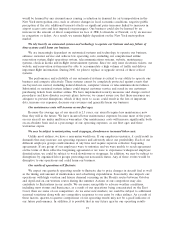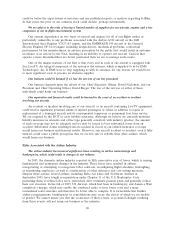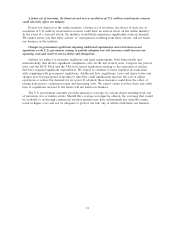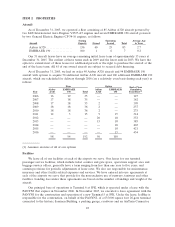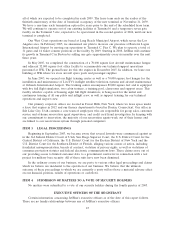JetBlue Airlines 2005 Annual Report Download - page 21
Download and view the complete annual report
Please find page 21 of the 2005 JetBlue Airlines annual report below. You can navigate through the pages in the report by either clicking on the pages listed below, or by using the keyword search tool below to find specific information within the annual report.
Year Ended December 31,
2005 2004 2003
Gallons consumed (millions) ............... 303 241 173
Total cost (millions) ....................... $ 488 $ 255 $ 147
Average price per gallon ................... $ 1.61 $ 1.06 $ 0.85
Percent of operating expenses .............. 29.5%22.1%17.8%
Total cost and average price per gallon each include fuel hedging gains and exclude taxes and
fueling services.
We have a fuel hedging program under which we enter into crude and heating oil option
contracts and swap agreements to partially protect against significant increases in fuel prices. However,
our fuel hedging program does not completely protect us against increases in the price of fuel and is
limited in fuel volume and duration. During 2005, we began layering in derivative contracts more
systematically to ensure we achieve a minimum targeted hedge position of approximately 30%of our
expected consumption for the next twelve months at any given time. At December 31, 2005, none of
these derivative contracts were designated as hedges for accounting purposes. There have been
significant increases in fuel costs and continued high fuel costs or further increases in fuel prices would
have a material adverse effect on our financial condition and operating results.
LiveTV, LLC
LiveTV, LLC is a wholly owned subsidiary of JetBlue which provides in-flight entertainment
systems for commercial aircraft. LiveTV’s assets include certain tangible equipment installed on its
customers’ aircraft, spare parts in inventory and rights to all the patents and intellectual property used
for live in-seat satellite television, XM Satellite Radio service, wireless aircraft data link service, cabin
surveillance systems and Internet services. LiveTV’s major competitors include Rockwell Collins,
Thales Avionics, Boeing Connexion and Panasonic Avionics. Except for Panasonic, none of these
competitors is currently providing in-seat live television.
LiveTV has contracts for the sale of certain hardware and installation, programming and
maintenance of its live in-seat satellite television system with Frontier Airlines, Virgin Blue and
WestJet Airlines. LiveTV also has a contract with AirTran Airways for the installation, programming
and maintenance of XM Satellite Radio Service. LiveTV continues to pursue additional customers.
Government Regulation
General. We are subject to regulation by the DOT, the FAA, the TSA and other governmental
agencies. The DOT primarily regulates economic issues affecting air service, such as certification and
fitness, insurance, consumer protection and competitive practices. The DOT has the authority to
investigate and institute proceedings to enforce its economic regulations and may assess civil penalties,
revoke operating authority and seek criminal sanctions. In February 2000, the DOT granted us a
certificate of public convenience and necessity authorizing us to engage in air transportation within the
United States, its territories and possessions.
The FAA primarily regulates flight operations and in particular, matters affecting air safety, such
as airworthiness requirements for aircraft, the licensing of pilots, mechanics and dispatchers, and the
certification of flight attendants. The civil aviation security functions of the FAA were transferred to
the TSA under the Aviation Security Act. The FAA requires each airline to obtain an operating
certificate authorizing the airline to operate at specific airports using specified equipment. We have
and maintain FAA certificates of airworthiness for all of our aircraft and have the necessary FAA
authority to fly to all of the cities that we currently serve.
Like all U.S. certified carriers, we cannot fly to new destinations without the prior authorization
of the FAA. The FAA has the authority to modify, suspend temporarily or revoke permanently our
authority to provide air transportation or that of our licensed personnel, after providing notice and a
hearing, for failure to comply with FAA regulations. The FAA can assess civil penalties for such
failures or institute proceedings for the imposition and collection of monetary fines for the violation of
13


